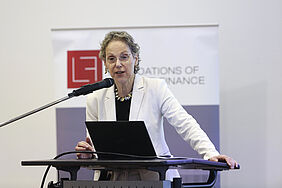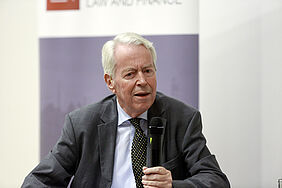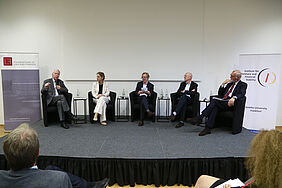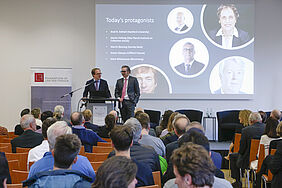Book Presentation with Panel Discussion on "The Bankers' New Clothes" by Anat R. Admati and Martin Hellwig
Goethe University, Frankfurt – October 10, 2024
The evening of October 10, 2024, saw a highly anticipated book event held at the Casino Building of Goethe University Frankfurt, organized by the Center for Advanced Studies on the Foundations of Law and Finance (LawFin) in collaboration with the Institute for Monetary and Financial Stability (IMFS) and the Leibniz Institute for Financial Research SAFE. The event drew an impressive crowd of around 200 attendees, reflecting the significant interest in the topic of financial regulation and reform. The focal point of the evening was the new, expanded edition of the book The Bankers’ New Clothes, authored by Anat R. Admati and Martin Hellwig, two of the foremost experts on financial reform.
The evening began with a warm welcome from the directors of the LawFin Center, Rainer Haselmann and Tobias Tröger, both professors at Goethe University. They emphasized the Center’s mission of fostering cutting-edge interdisciplinary research finance, law, and regulation and introduced the panelists and speakers for the night. Their remarks underscored the pressing need for ongoing scholarly inquiry into the stability of the global financial system and the role institutions like the LawFin Center play in bridging the gap between academia and policymaking.
Keynote: “What’s Wrong with Banking and Why?”
Following the introductory remarks, Anat R. Admati and Martin Hellwig took the stage to deliver an engaging keynote presentation on “What’s Wrong with Banking and Why.” Both authors, renowned for their cross-disciplinary insights on finance, regulation, and policy, set the tone for the evening by delving into the core arguments of their book. The expanded second edition of The Bankers’ New Clothes, published in January 2024, includes additional chapters and new insights into why the banking sector remains perilously unstable, despite promises of reform after the 2008 Global Financial Crisis.
Admati, a professor at Stanford University, opened the lecture with a stark critique of the current banking system, calling attention to the “false sense of security” many have held since the crisis. She pointed out how recent bank failures underscore the fundamental dangers that still lurk within the financial industry. These failures, she argued, expose the inadequacy of existing regulations and the harmful complacency of both policymakers and the public. Admati stressed that while some believe the system has been reformed, the fundamental risks remain, and the dominance of financial institutions continues to pose a threat not only to financial stability but also to democracy itself.
Martin Hellwig, a director emeritus at the Max Planck Institute for Research on Collective Goods, followed by outlining the technical shortcomings of current banking practices. He dismantled the pervasive notion that banks must operate with dangerously low levels of equity and highlighted the role of political resistance and vested interests in preventing more effective reforms. Hellwig's clear, concise explanation of capital structures and regulatory loopholes demonstrated how banks remain “too big to fail” and why the public continues to bear the brunt of banking crises.
A Heated Panel Discussion: Clashing Perspectives on Financial Reform
The keynote was followed by a lively panel discussion that brought together a distinguished group of experts, each with a unique perspective on the issue. Joining Admati and Hellwig on the panel were Martin Blessing, Chairman of the Board of Directors of Danske Bank, and Simon Gleeson, a senior consultant at Clifford Chance, specializing in banking and financial markets regulation. The debate was moderated by Mark Whitehouse, an experienced economics editor at Bloomberg.
What unfolded was a spirited and, at times, heated exchange between the panelists. Admati and Hellwig maintained their stance that the banking system remains dangerously fragile and in need of far more radical reform. They were vocal in criticizing the current state of regulation, arguing that the financial sector is still rife with practices that place the global economy at risk. Admati noted that banks had been allowed to operate with too little equity for too long, and that the costs of this complacency were borne by society as a whole.
In contrast, Martin Blessing, drawing from his extensive experience in leading major financial institutions such as Commerzbank and UBS, defended the current system’s structure and resilience. While acknowledging that more can always be done to improve risk management, he argued that the financial industry has made significant strides since the crisis. Blessing pointed out the increased regulatory oversight and enhanced capital buffers that banks are required to maintain. He asserted that lessons had been learned from the past and that the system was far more robust today than it had been in 2008.
Simon Gleeson, bringing in a legal and regulatory perspective, offered a more nuanced view. He agreed with some of Admati and Hellwig’s criticisms but also urged to understand banks primarily as payment services providers instead of credit suppliers and explained the policy consequences of this perspective. He cautioned against overly prescriptive reforms. According to Gleeson, the complexity of the financial markets requires a balance between regulation and flexibility, warning that too much regulation could stifle innovation and economic growth.
The discussion between the panelists grew particularly intense when the topic of moral hazard was raised. Admati and Hellwig argued that banks continue to take excessive risks, secure in the knowledge that they will be bailed out by governments if things go wrong. Blessing pushed back, emphasizing that banking is inherently a business of risk and that regulators have introduced mechanisms to mitigate these dangers without suffocating the industry. Gleeson purported that crisis management frameworks today are much better prepared to handle the failure of cross-border banking groups and that therefore cross-border M&A transactions should not be blocked because of resolution challenges.
This back-and-forth resonated with the audience, which appeared just as divided.
Reception and Networking
Following the panel, guests were invited to a reception, where discussions from the evening continued to animate conversations. The event offered a unique networking opportunity for academics, policymakers, and financial professionals to exchange ideas and debate the future of banking regulation in a more informal setting. Many attendees appeared invigorated by the provocative discussion, eager to explore how Admati and Hellwig’s ideas could influence future policy decisions.
Conclusion
The event at Goethe University successfully highlighted the ongoing importance of scrutinizing financial regulation in a world still grappling with the aftershocks of past crises. The evening’s discussions, framed by the thought-provoking insights of Admati and Hellwig, underscored the challenges of enacting meaningful reform in the banking sector. While opinions on the panel were divided, the consensus among attendees was clear: the conversation about banking reform is far from over, and books like The Bankers’ New Clothes are crucial in keeping this debate alive.





